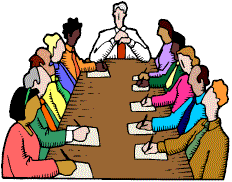
Tips for Effective Meetings
Meetings, meetings and more meetings... Everybody has them. Everybody hates them. Are meetings necessary? How do you handle meetings? Do you put them off until you can't avoid them any longer? Do you find yourself daydreaming? Do you wish that one or more of the people in your meeting would just shut up so that someone else could talk and you could get finished? Don't feel alone. It is a fact that meetings are one of the greatest time wasters in any organization.
Nowadays many companies are doing more work with fewer people and less resources than ever before. Meetings and voluminous junk-mail from produces and manufacturers including e-mails in the internet become nearly unmanageable. There is still hope. A few tips to effectively conduct a meeting (… if and only if there is a need to have one) are presented below:
Set a place, a time (beginning and ending), and an Agenda.
Make
sure everyone that willattend knows what topics will be covered in the meeting
before they get there in that way, they will know how to prepare.
Keep it short.
Have the meeting just before lunch or quitting time. People tend to be less windy if they are hungry. It may be necessary to follow up with people after a short meeting, but more gets done in two twenty minute meetings than in one hour long meeting.
Keep 'em on their toes.
If possible have your meetings in the garage, in the field or in the project, or in some place where the participants can't sit in a cushioned chair in an air conditioned room and fall asleep. If everyone is standing, things will go a lot faster.
Keep it informal.
You can cover a lot of information around the coffee pot or the microwave in the morning. The information will get to the people who need it, and they won't even know they've been in a meeting.
Start at the end.
Don't spend time and effort in building up to your point. Tell them what you want them to know at the beginning. Then if you have to cut the meeting short, the important stuff will have been covered.
Stick to the subject.
Don't get philosophical; focus on your personnel, your equipment, your schedule, and your work.
 Delegate.
Delegate.
Let someone else run the meeting. It may help them organize their thoughts and will help them develop their communication and supervisory skills. If you do delegate control, be supporting and back them up if they need it. Make sure that the group gives the meeting leader the proper attention and respect.
Two-way open communication.
In this approach, you may learn of problems or solutions that you might never have recognized any other way. Meetings are a tool for you to effectively manage your time and to accomplish the goals of your business.
Adapted from Louisiana LTAP, Technology Exchange